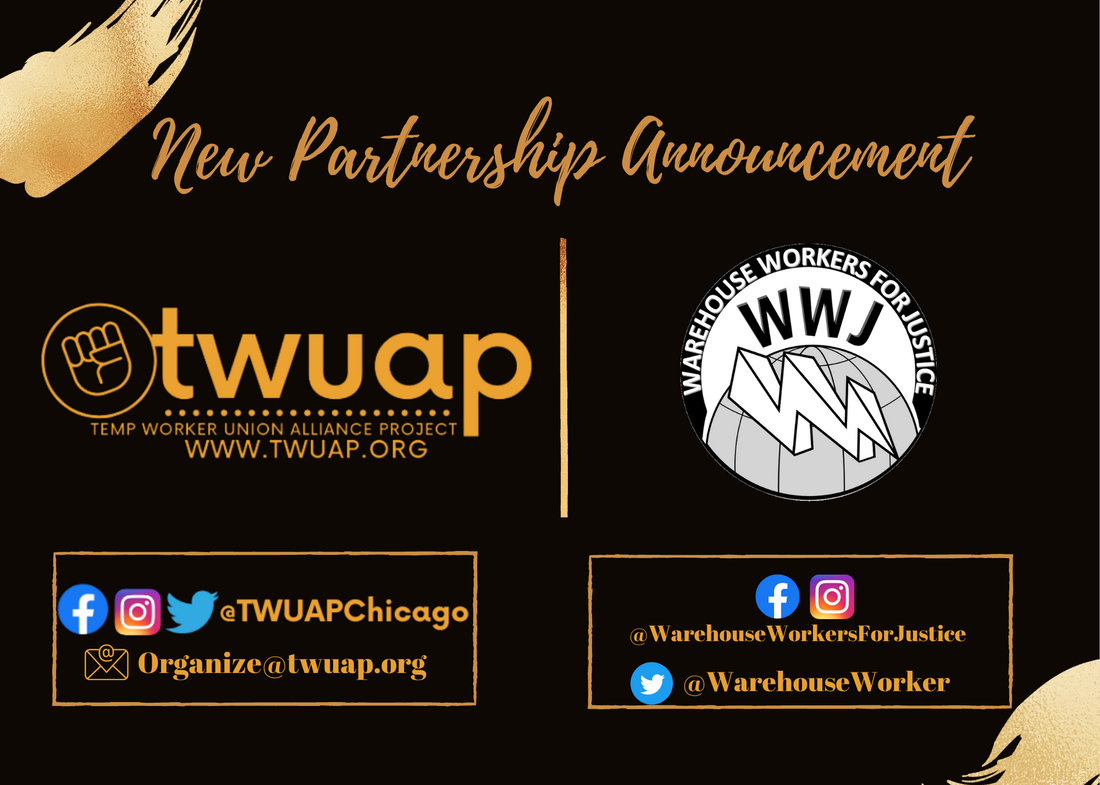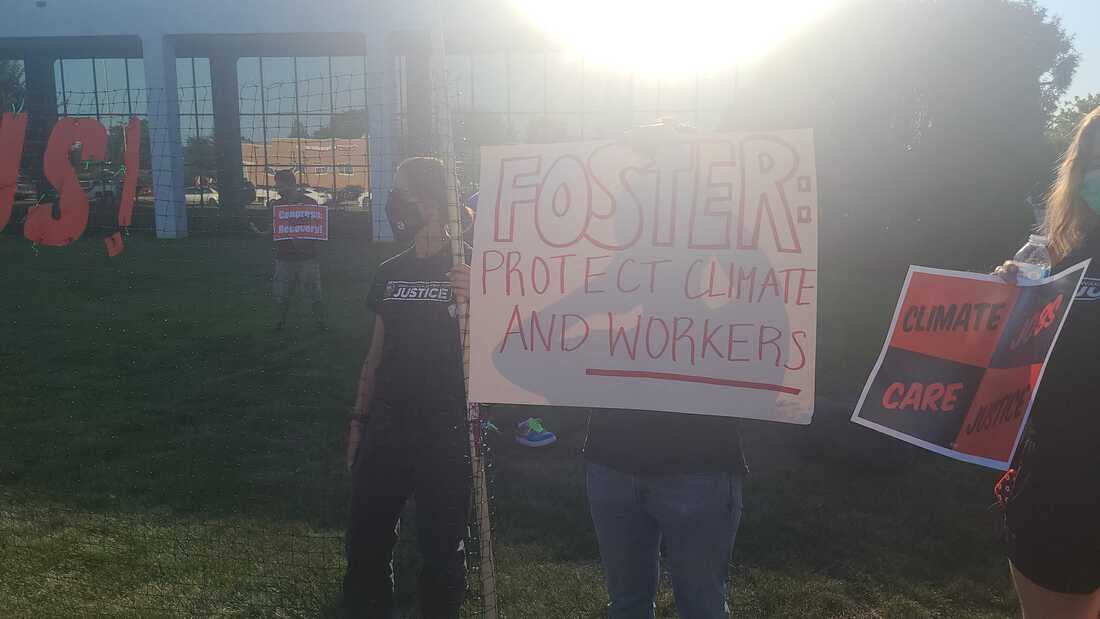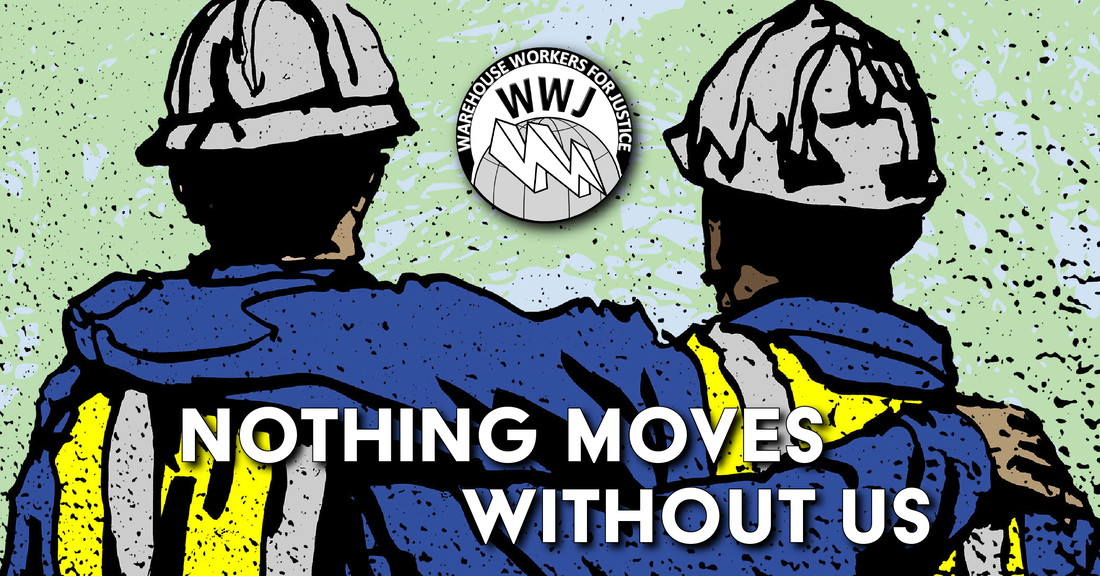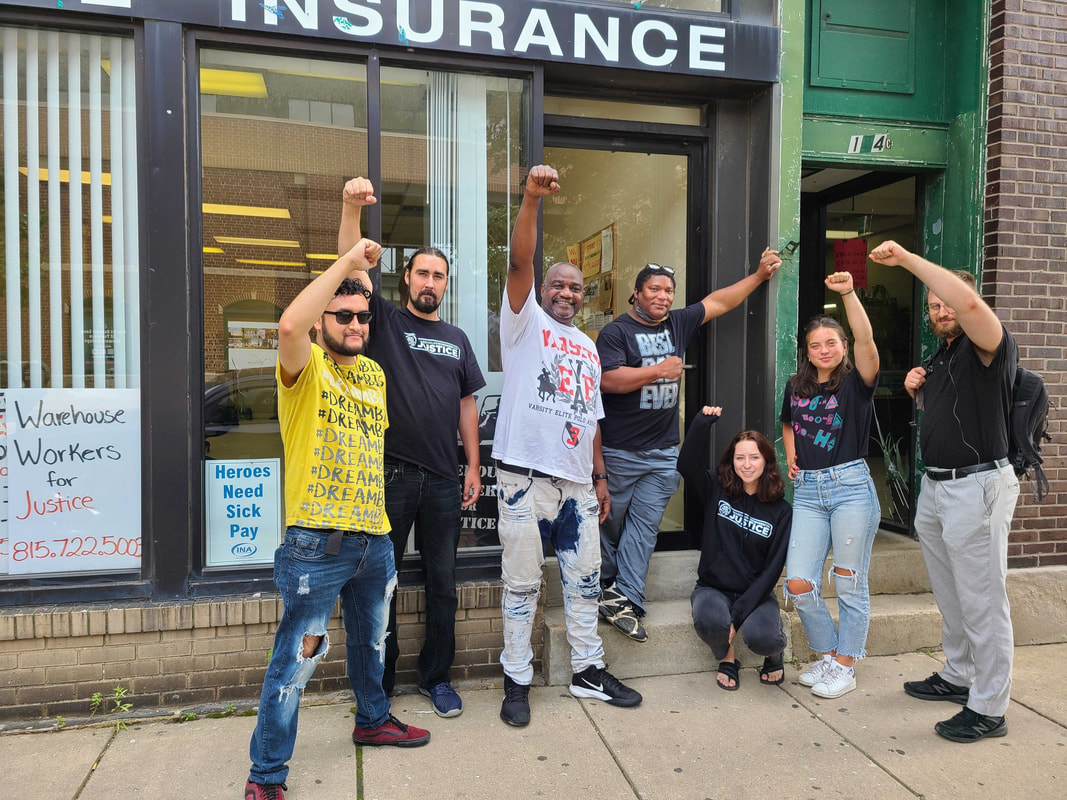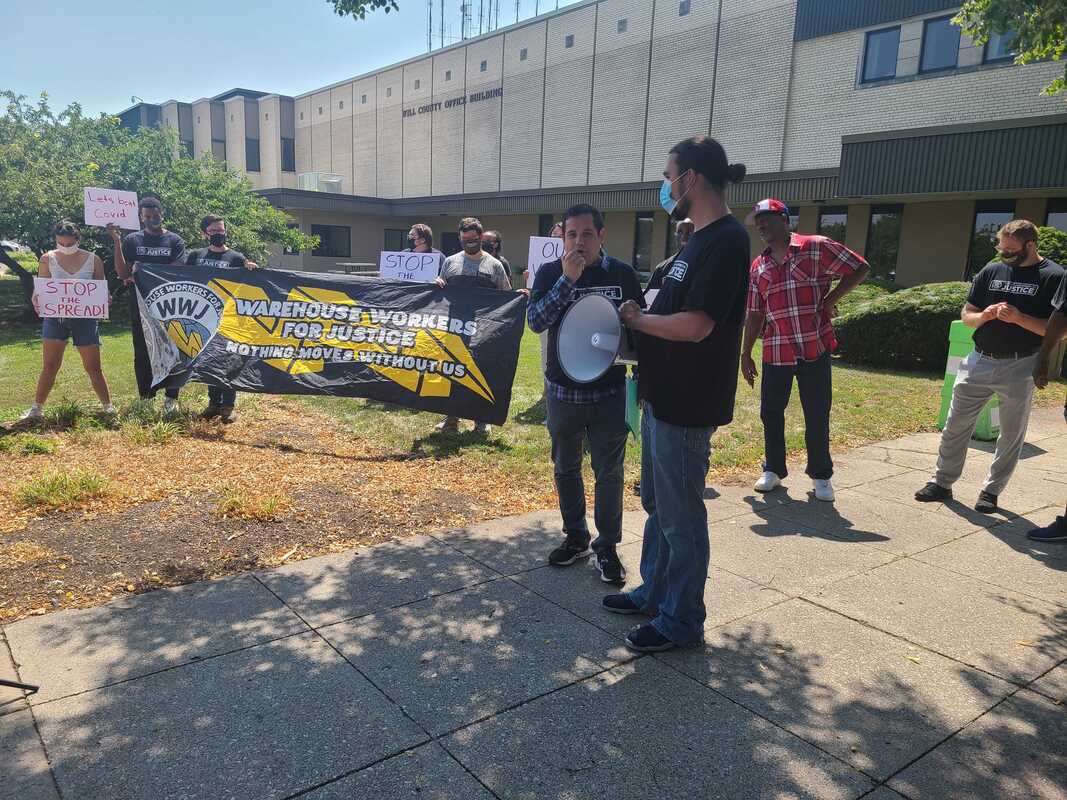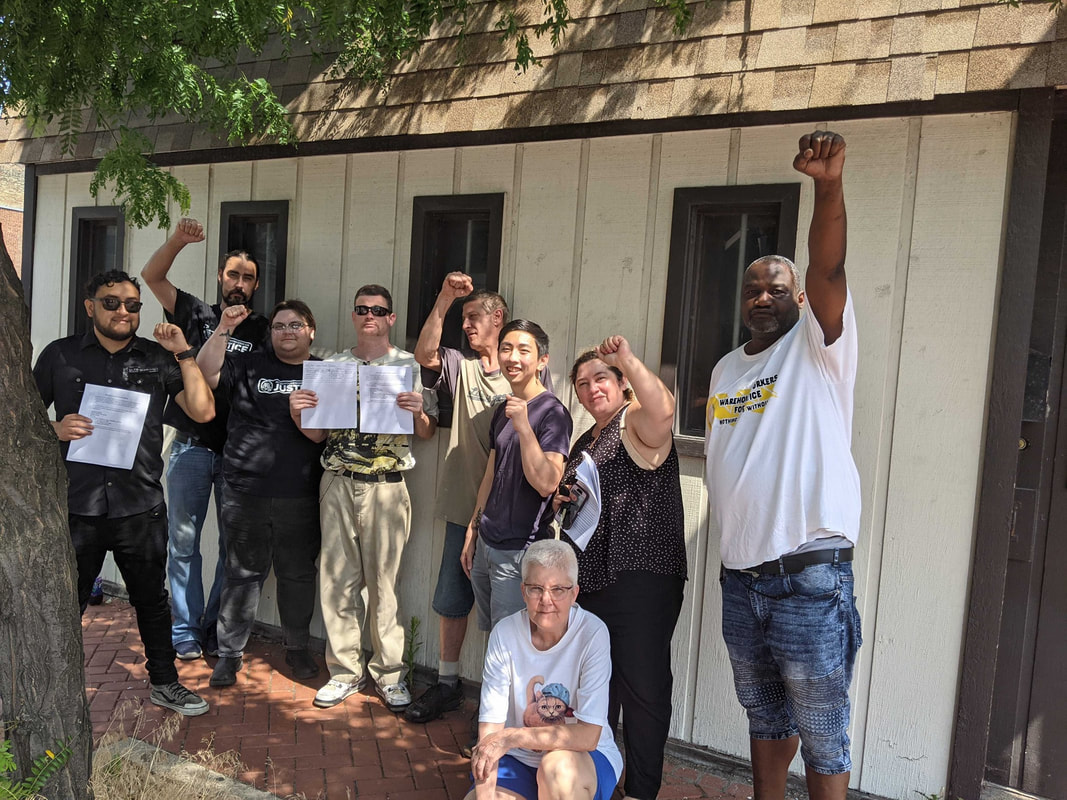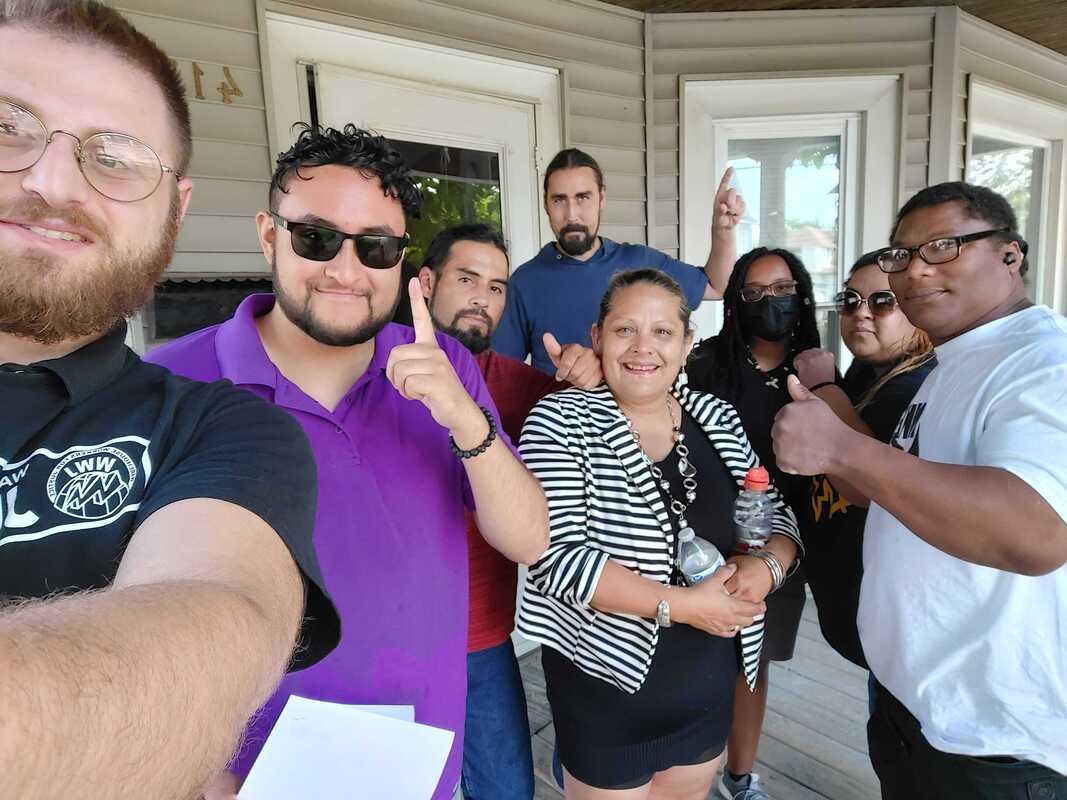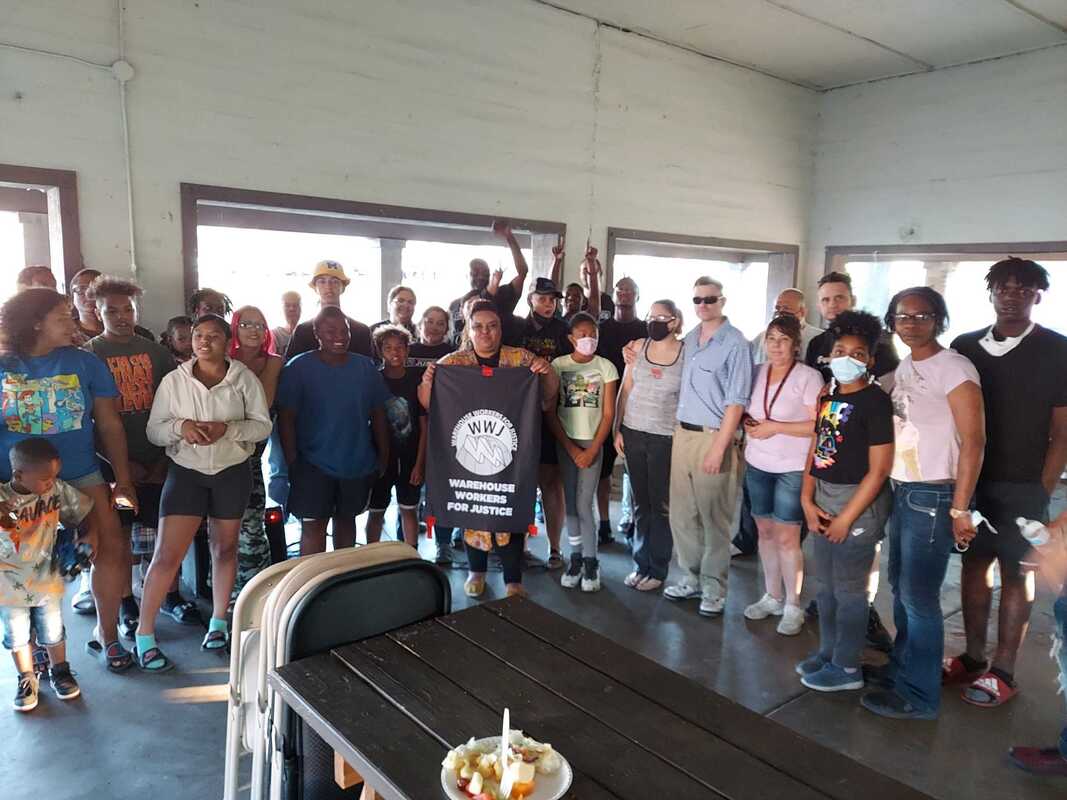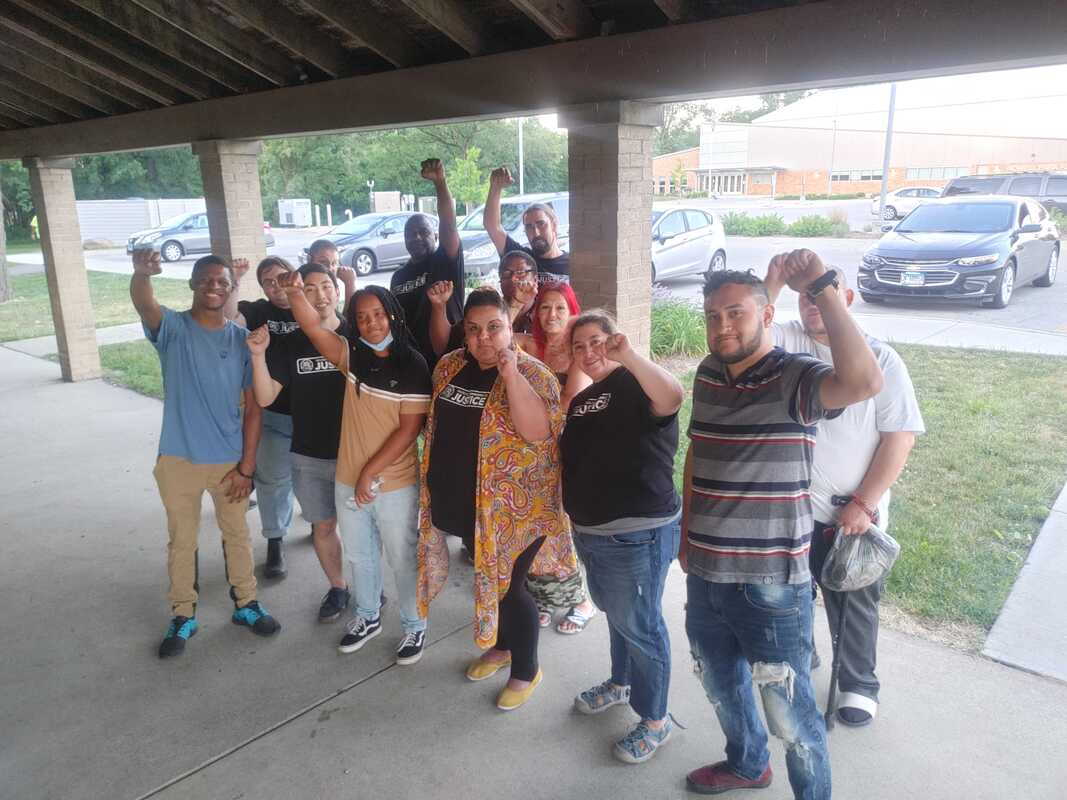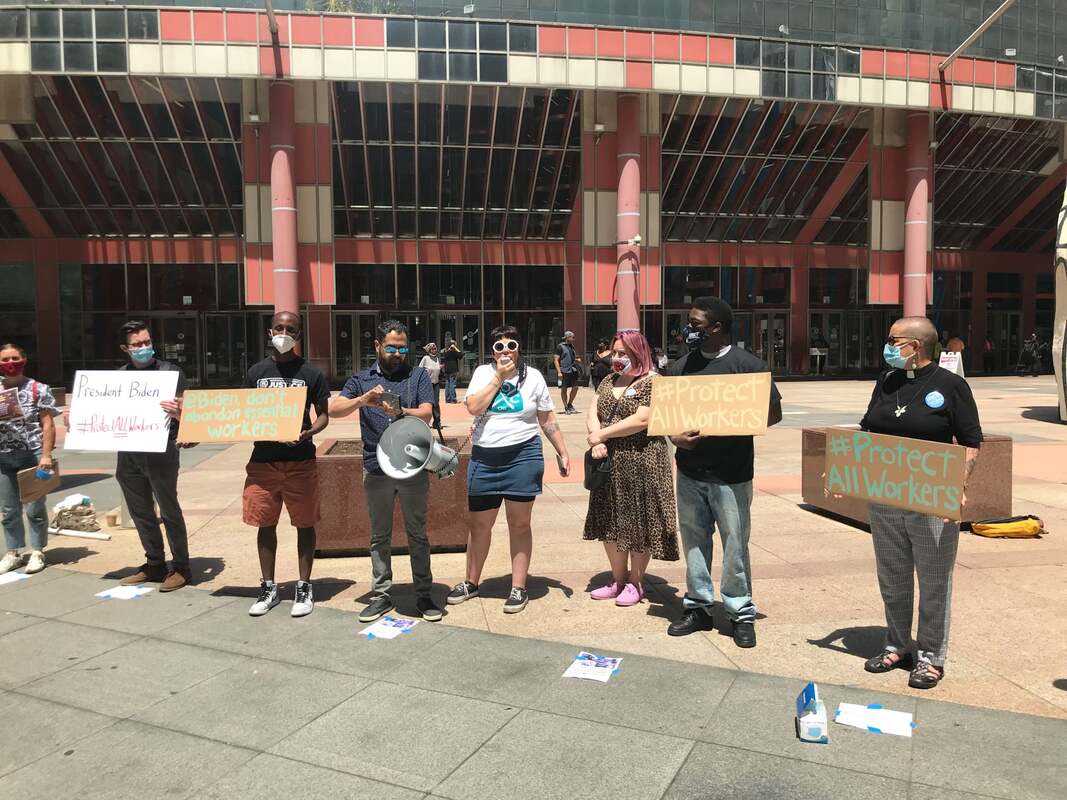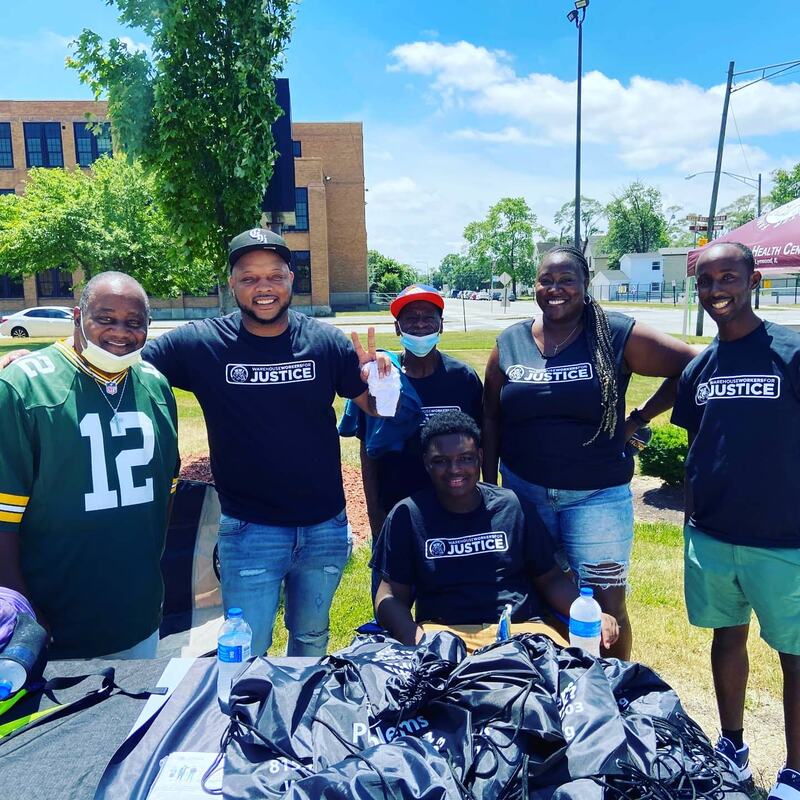|
Warehouse Workers for Justice (WWJ) and the Temp Worker Union Alliance Project (TWUAP) announce their integration partnership, building collective power among Warehouse Workers, Temp Workers and Unions.
The Temp Worker Union Alliance Project (TWUAP) is a project housed in Warehouse Workers for Justice. TWUAP is made up of union leaders, worker center leaders, and allies. TWUAP rallies around concerns over the rise of non-union temp labor and the need to collectively fight to build both worker power and the power of locals. TWUAP aims to strengthen the labor movement by helping temp workers win economic stability and quality union jobs. Warehouse Workers for Justice is a worker center fighting for good living-wage jobs in Illinois' warehouse and transportation industry. Warehouse Workers for Justice builds political and economic power for working families and community-led infrastructure for progressive organizing in a pivotal area for both Illinois statewide politics and national economic justice fights in warehousing and logistics. "WWJ cares about temp workers," said WWJ Executive Director Roberto Clack. "This is work that we’ve always been involved in, so we’re very happy about the partnership with TWUAP to further that work." "Having the support from a well-established worker center like WWJ can greatly enhance the potential reach for TWUAP," said TWUAP Director and Lead Organizer Jannelle White. Last week, we rallied in front of Congressman Foster’s office to urge him to fight for the full $3.5T in the reconciliation package being considered by Congress and refuse any cuts to invest in our communities. This week, the House of Representatives (including Foster) passed the full reconciliation package with the potential to fund climate solutions, the care economy, and quality job creation.
Through this funding, we have the opportunity to sustainably modernize our country’s infrastructure to protect our economy, environment, and public health and invest in working class communities like the ones in Joliet and Will County. What this could mean for Joliet is truck electrification to reduce pollution, expanded healthcare, funding for childcare, and more. In the coming months, this funding will go through a process where committees in Congress decide exactly how the funding should be allocated and spent. We’ll continue to organize to ensure our local Members of Congress are fighting for working class families, a just transition to renewable energy, and quality and dignified jobs. August 13th, 2021
The Honorable J.B. Pritzker Governor of the State of Illinois Illinois State Capitol 207 Statehouse Springfield, IL 62706 The COVID-19 pandemic brought into sharp focus the conditions of warehouse work across the state of Illinois, and particularly in Will County. Warehousing and manufacturing were the second hardest hit industries for coronavirus outbreaks across the state. Unsafe working conditions in warehouses and damage to surrounding communities were not the result of the pandemic, but were the fuel that allowed the pandemic to rage throughout Will County. The conditions that enabled this destruction were not accidents. They were results of decisions made by elected officials who have allowed major corporations with crucial distribution hubs in Will County to prioritize their ever-expanding profits over the health, safety, and economic security of their workers, their workers’ families and communities. Despite the glaring injustices illuminated by this global crisis, we are seeing proposals for more unsafe, unstable, low-paying jobs in a sector that is employing predominantly workers of color. More tax breaks for some of the largest and most profitable corporations in the world. More diesel-fueled trucks to finish off the broken roads and bridges in Will County and pump even more air pollution into communities of color already suffering from environmental racism. The Compass Global Logistics Hub is not in line with what communities in Will County want. Yet, Senators Tammy Duckworth and Dick Durbin, Representatives Bobby Rush, Robin Kelly, Bill Foster, Marie Newman, Will County Executive Jennifer Bertino-Tarrant, and Joliet Mayor Bob O’DeKirk are calling on Governor Pritzker to steamroll in despite the local residents’ rejection of the project. If local communities wanted this project to be built, there would be no need for Northpoint. The billionaire developer behind this project has publicly boasted about using the exploitative warehousing and logistics industry to get rich quickly (flaunting multiple company trips to Bora Bora) to put pressure on the Governor to overrule the will of a municipality to make the project happen. Residents, environmental justice groups, and warehouse workers alike have repeatedly communicated their rejection of the project, including in an action speaking directly to two signatories on the letter, Senators Durbin and Duckworth, but community demands have been ignored by the very officials who have been elected to represent the needs of these constituents. In their letter to Governor Pritzker, these officials promise that Northpoint “will create thousands of jobs and produce significant new revenue for the state and local economies.” This is the promise. Now to the reality. What do we know such a development will produce? We know that major corporations like Amazon will continue to snowball their profits off increased production and massive tax breaks, as they did with previous major developments. We know that these corporations will continue to contract out their labor to temporary staffing agencies that have been repeatedly found to pay poverty wages to, discriminate against, steal from, and unjustly terminate workers of color. We know that the trucks and warehouses that move product for these major corporations will continue to destroy roads and bridges, pollute the air surrounding communities breathe and deplete the water they drink. Where is the guarantee of better working conditions, family-supporting jobs, crucial infrastructure investment, healthier communities, and environmental justice? There are no guarantees. There are no lessons learned. In light of this, Warehouse Workers for Justice (WWJ) is calling on you to listen to your constituents, especially the workers and communities of color who will be most impacted by this project’s bad jobs and environmental injustice, and say “no” to Northpoint. We applaud Governor Pritzker for not giving in to calls from those with wealth and political connections to overrule the will of local municipalities such as Elwood, whose residents have been nearly unanimous in their opposition of this project. Residents should have the right to make these key decisions about the future of their communities. Warehouse workers and their families in Will County are demanding a better deal, a deal where those most impacted by the expansion of the warehousing and logistics industry have power to demand better labor and environmental conditions and use the strategic role Will County plays in the global supply chain to set a higher standard for the industry as a whole. We reject the paradigm that all new jobs are unquestionably good. Warehouse workers’ bodies have the scars to prove otherwise. Decisions should not be made to bring more bad jobs under short-term political considerations and pressure from groups like “Elected Officials for Jobs & Economic Development in Will County.” Decisions that will affect workers, their families, and their communities for generations should be made by them, not by business groups purporting to speak in their interest. Signed, Warehouse Workers for Justice FOR IMMEDIATE RELEASE: Tuesday, August 3rd, 2021
PRIMARY CONTACT: Tommy Carden, 312.206.8901, [email protected] SECONDARY CONTACT: Andrew Herrera, 847.977.3645, [email protected] Warehouse Workers for Justice Mourns the Death of a Food Warehouse Worker in Crest Hill A local warehouse worker was killed at Rich Productions on July 20th after an accident at the facility. The local warehouse has had several serious OSHA violations in the past including ‘Locking and Tagging’ violations and an accident where there was an amputee. “Warehouse Workers for Justice are heartbroken to find out about the recent loss of a warehouse worker and community member, Wale Ogunyemi. Wale worked as a sanitation worker at Rich Products Corporation in Crest Hill, Illinois, where he was killed on the job in a senseless workplace accident. Unfortunately, Wale’s death was not the first at the facility. In 2016 and 2017, two workers died at the same Rich Products Crest Hill facility. Rich Products Corporation has proved itself to be a repeat violator of workplace health and safety protections, failing to implement proper safety precautions that resulted in at least one amputation. Per Occupational Safety & Health Administration (OSHA) 300 logs obtained by Warehouse Workers for Justice, there have been at least 51 serious injuries at the facility since 2016 and on July 21, OSHA, opened an investigation into Wale’s death. Warehouse Workers for Justice is troubled to see that a local warehouse could be allowed to continue conducting its business in a way that puts its employees at risk of tragic outcomes like what we saw here last week. In light of this tragedy, we stand in solidarity with the community and are committed to seeking accountability for the willfully negligent employer whose inaction and disregard for workplace safety have created the conditions for this terrible accident. Warehouse Workers and community members can reach out to report unsafe working conditions by calling our anonymous tip line at 815.722.5003 or contacting us at wwjworkeroutreach.org/contact Based in Joliet, Illinois, Warehouse Workers for Justice is a worker center fighting for stable, living-wage jobs in warehouses and distribution centers. We educate workers about labor rights, teach folks how to enforce their rights, organize in the workplace and community and fight for public and private policies that promote full-time work at decent wages in the warehouse industry. Amazon Puts Profits Over People By Eliminating On-Site Testing For Warehouse Workers on July 307/29/2021
While WWJ has been gearing up to build worker protections, Amazon is rolling back on safety measures and putting everyone at risk to maximize profits.
Warehouse Workers for Justice (WWJ) strongly condemns Amazon’s decision to end on-site COVID-19 testing on July 30. This decision sends the wrong message to the public at a moment when cases are rising and vaccination rates are falling. With only less than 50% of the general population being fully vaccinated, warehouse workers remain at an increased risk. Making matters worse, Amazon has repeatedly failed to inform warehouse workers about COVID-19 cases and provide safeguards to protect its employees, and their families. In fact, Amazon has potentially fueled the pandemic from within warehouses by failing to provide hazard pay, paid sick leave, and COVID-19 accommodations—creating conditions that have gotten workers sick and potentially led to increased community spread. There’s a reason that Amazon hasn’t publicly shared data since October 2020, when they admitted to more than 19,000 positive cases among its frontline workers. We call upon elected officials and communities to hold Amazon accountable and to not normalize these horrific conditions. We simply can’t allow one of the world’s largest corporations to receive over $4 billion in public subsidies while it puts workers and communities at risk. On Monday, July 12th at approximately 3:15pm, an unknown shooter opened fire into the WWJ office in Joliet, destroying our front door and passing through our normally crowded office space. Typically, there are up to four staff members in the office meeting with workers, hosting community events, and organizing our programs, but luckily everyone was gathered at a staff meeting off site and nobody was harmed.
On July 15, we launched an emergency fundraiser to repair our space and help make it a safe haven for workers and community members to gather. In less than 24 hours of launching our campaign, we exceeded our goal. We'd like to thank every Warehouse Workers for Justice supporter who gave to our emergency fundraiser, expressed concern, and helped us spread the word. Thanks to all of you, we were able to surpass our goal and raise over $4,200 to cover the necessary repairs and renovations to our Joliet office. Your generous contributions have helped us replace our front door and get to work on installing a security system that will make our space more secure for staff, workers, and the Joliet community to organize. Any excess funds will support our Worker Outreach Program, which provides workers and community members and tenants with legal help, access to the COVID-19 vaccine, support with workplace issues, and much more. We’re incredibly grateful to have you on our side as we continue fighting for a better future. As the dangerous Delta COVID variant spreads, Warehouse Workers for Justice continues to urge warehouse workers and our community members to get vaccinated if they have not already done so. In response to the surge of COVID cases due to the Delta variant, Warehouse Workers launched an on-going series of Vaccine Ambassador Training events.
Following our Emergency Press Conference and Vaccine Outreach event on July 26, we held our first two virtual training sessions in the last week of July, which can be viewed on-demand through our Facebook page. The first event was held in English on Tuesday, July 27, and the second event was held in Spanish on Wednesday, July 28. Warehouse Workers for Justice invites folks to join and share our other upcoming Vaccine Ambassador Training events, where we will continue to discuss best practices when talking to hesitant family & friends about the importance of vaccination for health & safety:
Researchers and public health officials agree that vaccination offers protection against the highly transmissible delta variant. While the COVID-19 vaccine is now widely available, one major obstacle is overcoming hesitancy among our communities. Stopping the spread of COVID-19 in our communities is a shared responsibility. It’s up to each of us to talk to our coworkers, friends, and family. Will you join and support us in fighting COVID-19? On Monday, July 26, Warehouse Workers for Justice (WWJ), Temp Worker Union Alliance Project (TWUAP), and our allies held an Emergency Press Conference and Vaccine Outreach event to emphasize the critical need for community members to get vaccinated to stop the spread of COVID-19.
The event was attended and covered by the following media outlets: The Herald-News, WBBM, Telemundo Chicago, and ABC Channel 7. Speakers at the press conference — which included WWJ Executive Director Roberto Clack, WWJ Community Health Navigator & COVID Survivor Brandin McDonald, Will County Health Department Vaccine Equity Manager Vinita Voss, WWJ Member Alfred White, a UIC School of Public Health representative, and Joliet City Councilman Cesar Guerrero — urged community members and especially warehouse workers to get the vaccine if they have not yet done so. At the press conference, Guerrero addressed the impact of COVID-19 on the warehousing industry. Unvaccinated warehouse workers remain at an increased risk of infection due to the job conditions of the industry. Cramped or tight spaces, high traffic and contained areas, and high work rates is one workplace condition that places them at a particularly high risk. Guerrero also explained how the employment structure of warehouses through temporary staffing agencies makes detecting, protecting against, and fighting COVID another serious challenge. Following the press conference, WWJ targeted zip codes in Joliet with the highest infection rates, took to the streets, and went door-to-door to inform and implore unvaccinated community members to get vaccinated. As a part of our work, Warehouse Workers for Justice (WWJ) collaborates with Westside Justice Center to support tenants in organizing, learning their rights, and keeping their homes. We’re proud to announce two major victories we won in the month of June. Throughout May, tenants reported utility and maintenance problems to the City of Joliet. Instead of getting the landlord to make necessary repairs, the city gave tenants notices to vacate—within one month. Tenants — supported by WWJ and Westside Justice Center — organized, learned their rights, and told the city that one month was nowhere near enough time to move. Last Friday, June 18, was the original deadline for tenants to vacate. Instead, tenants kept their homes and delivered a petition to the landlord demanding them to make the necessary repairs instead! When we fight, we win! For weeks, Linda got harassing text messages from her landlord demanding she move out. When he told her he planned to enter her home with police, she left nothing to chance.
With support from WWJ and Westside Justice Center she made it clear to the landlord and police she knew her rights and wouldn't be intimidated into leaving. Police followed the law and the incident ended peacefully. We'll continue to defend Linda's home with her, each step of the way. Solidarity forever! To get updates on events like these and more, join our mailing list and follow us on Facebook, Twitter, and Instagram. Like the weather, the activity at Warehouse Workers for Justice has been heating up throughout June. In addition to our usual work and most recent action — Our Prime Day Order: Justice From Amazon! Community Rally — we’ve continued to expand our work in organizing workers and community members, developing community programs, and strengthening connections with other organizations. Will County Community Meeting On Tuesday, June 15, 2021, Warehouse Workers for Justice met with Joliet community members to discuss tenant rights, worker’s rights, available community resources, and collective solutions for issues that community members have been facing. Workers Can’t Wait! June 15th National Day of Action For over a year, essential workers have been waiting for the government to issue protections that would keep them safe in the face of the pandemic. Workers and advocates around the country organized a National Day of Action on Tuesday, June 15th to demand that President Biden issue a strong Emergency Temporary Standard that covers ALL workers NOW! Warehouse Workers for Justice joined the HEAL Food Alliance — as well as other workers, organizers, and advocates — in speaking out. Youth Day
Warehouse Workers joined several other community-based organizations in supporting and celebrating Cook County Department of Public Health’s Youth Day. On Saturday, June 19, 2021, the community celebrated summer with a cookout and a free Six Flags Great America amusement park ticket to anyone who got vaccinated. The event featured music and community. To get updates on events like these and more, join our mailing list and follow us on Facebook, Twitter, and Instagram. |
Archives
December 2023
WWJ News from 2016 and before can be read here: |

